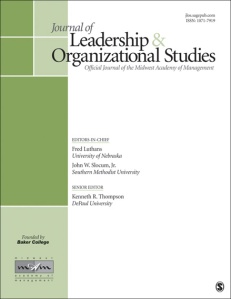What Qualities Should We Look For In a Leader?
On the heels of the first 2012 U.S. presidential debate, we bring you an insightful new article from the Journal of Leadership & Organizational Studies by Robyn L. Brouer of SUNY Buffalo, Ceasar Douglas of Florida State University, Darren C. Treadway of SUNY Buffalo, and Gerald R. Ferris of Florida State University. The study examines political skill as a set of social competencies having a significant impact on leadership effectiveness:
Politically skilled individuals are socially astute, having an accurate perception of both their own and others’ behaviors as well as the social interaction in general, which allows them to be influential ….Those high in political skill also possess interpersonal influence, which is reflected in a certain style that allows them to easily influence others, providing  the adaptability to change their behaviors as the situation demands in order to achieve desired goals …. [T]hese individuals are characterized by networking ability and are able to forge friendships and build coalitions, strong beneficial alliances, and networks, thus vesting the politically skilled with a great deal of information and social support that they can share with followers….Last, politically skilled individuals are seen as possessing high degrees of integrity and authenticity, thus creating perceptions of as genuineness and sincerity in their interactions.
the adaptability to change their behaviors as the situation demands in order to achieve desired goals …. [T]hese individuals are characterized by networking ability and are able to forge friendships and build coalitions, strong beneficial alliances, and networks, thus vesting the politically skilled with a great deal of information and social support that they can share with followers….Last, politically skilled individuals are seen as possessing high degrees of integrity and authenticity, thus creating perceptions of as genuineness and sincerity in their interactions.
Read the article, “Leader Political Skill, Relationship Quality, and Leadership Effectiveness: A Two-Study Model Test and Constructive Replication” in the OnlineFirst section of the Journal of Leadership & Organizational Studies.
































































































